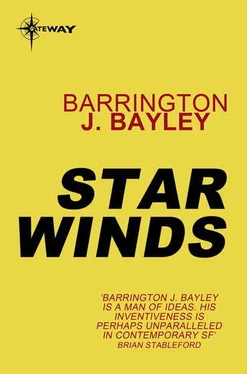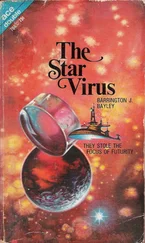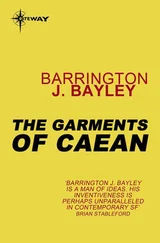Zhorga called for Salwees, a sailor who doubled as barber and amateur surgeon. While the wounds were being dressed he turned to Bruge, one of those who had come bursting in from the storeroom.
“Thanks for your intervention,” he said. “I was wondering where you were.”
“We couldn’t get loose straight away,” Bruge replied. He grinned crookedly. “They took us by surprise, you know. But you needn’t worry about us—we’re with you, all the way.”
Zhorga nodded. He turned to face the rest of the crew, who were staring ashen-faced. “So, you want to go home,” he rumbled. “Well, there’s only one thing I can say to you—put the thought out of your minds. It’s Mars we’re bound for, and Mars is where we’re going. When we come back, you’ll all be rich.”
“We’ll never get there!” a sailor backed against the bunks protested in a tremulous voice. “The ship’s simply not up to it. Already we must be way off course!”
“It’s true we’re a few degrees off,” Zhorga admitted in an even, reasonable tone, “but it’s nothing we can’t compensate for. We’re navigable; we can correct errors.” His voice became suddenly impatient. “Do you think I can’t read an astrolabe?”
“You can’t correct for space monsters,” another voice muttered.
“Don’t talk nonsense. There are no such things,” Zhorga retorted firmly. “Now listen to me, all of you. Instead of quaking in your boots the way you are, you should be feeling proud of yourselves. You’ve proved that a wooden hulk like the Queen can be taken up into space, given enough sail—and enough guts—and that’s an achievement. Everyone will look up to you when you get back to Earth—and you’ll get back, never fear. You’ll be wealthy into the bargain, if we return with a hold full of silk. Thanks to you, the interplanetary trade might even revive.
“Now there’s nothing much between us and Mars, so from now on I anticipate an easy journey,” he continued. “As for turning back, well, I wouldn’t try it even if I wanted to. We’re in space now, and you can’t backtrack on your course just like that. If you could, you’d find the Earth had moved on and you’d likely never catch her. These things have to be planned a long time in advance. To put it bluntly, to go back we have to reach Mars first.”
Zhorga’s words, consisting mainly of half-truths, were greeted by silence. Nevertheless he knew the rebellion was over. He hoped his men understood now that if they wanted to stay alive there was only one person they could rely on—himself.
* * *
Back in his cabin with Rachad, Zhorga sat down and began to brood anew over a problem that had occupied him ever since the sail canopy had been extended.
It would not have reassured the crew to know that the dangers of takeoff they had so narrowly survived were not, in Zhorga’s view, anything like so hazardous as the business of landing on Mars. The tricky part of traveling to a downwind planet lay in being able to shed the velocity that had been gained on the way over, if one were not to go streaking through its atmosphere like a meteor. The recognized way of doing this was to fly past the target planet at short range, allowing its natural attraction to pull the ship into circum-planetary orbit. The ether itself could then be used to reduce speed, during as many circuits as were necessary.
But Zhorga did not trust his sense of computation too far. If he missed planetary capture he would find himself hurtling out into the Girdle of Demeter. So he was left with the alternative method: tilting at Mars head-on, going for dead center, and braking on the retroactive shock wave the planet created in the ether flow. If, that was, the Wandering Queen ’s timbers were equal to the strain.
The prospect so worried Zhorga that he had scarcely begun to think about the homeward journey, for which different tactics altogether were required. To travel to an upwind planet one sailed against the solar system’s general rotation, so as to lose angular momentum. The massive attraction of the sun would then draw the ship inward, enabling her to match orbits with the target planet and land.
But once again the theory was simpler than the practice. How much angular momentum should be shed? Guesswork would not be enough.
Zhorga sighed, rose, and taking a handful of powdered air from a walnut box, poured it into the smoldering urn. Wearily he rubbed his face with his hand, then suddenly noticed that Rachad was watching him attentively, aware of his troubled mood.
“You’d better bed down here in the sternhouse for a while, Rachad,” Zhorga rumbled. “Some of the crewmen might have it in for you.”
The Wandering Queen swept on through the blazing darkness, gaining velocity all the time. Zhorga’s thick black hair, Rachad saw for the first time, was streaked with gray.
For all Zhorga’s assurances, the voyage of the Wandering Queen continued to be fraught with difficulty. The continuous beating of the sun on the ship’s bottom caused her interior to become stiflingly hot, but what was worse, softened the caulking, making it bubble and leak. The crewmen were obliged to spend much of their time making good these breaches, and some became so terrified of asphyxiation that they tried to sleep in their space-suits, only to be forcibly dragged from them for the sake of conserving the powdered air.
Zhorga became concerned at the damage the heat was doing to the costly essences and expensive wines included in his cargo—damage which, he now saw with hindsight, could have been prevented if a reflective screen had been fitted under the hull. But annoying though this was, there were more serious worries. For one thing, chasing Mars across the sky was proving not nearly so simple as he had imagined. His first attempt, guided by orrery and astrolabe, to make a course change by bracing a few sails had ended in the ship swinging wildly off-center, forcing him to issue a hasty countermand. The rules of aerial flight, he was discovering ruefully, were not all good for space.
But gradually he was getting the hang of it. The sun receded and the ship cooled, and life aboard her settled into a routine. Fear faded in most into a mulish resentment, even to growing pride. And there were always a few to whom every moment was a glorious adventure…
* * *
Blue silk billowed and strained all around Rachad. Occasionally the sails rippled as they met some tiny irregularity in the ether flow and the ship trembled ever so slightly. Mostly, however, everything was rock-steady. It required an effort of the imagination to realize that the ship was moving at all.
Having finished his daily task of checking tacks and pulleys, he was making his way along a yardarm. Below him, the maindeck was deserted. Overhead he could see Mars, glowing like a red warning lamp, and to one side, as if below the level of the deck, was an equally brilliant blue-white star he knew was Earth.
Suddenly something seemed to flash past him, so close as to make his heart jump. A meteor, he decided apprehensively—the one accident a spacefarer could do nothing to avoid. Making sure his safety line was clear, he stepped off the foot-rope, let go the yard, and floated gently down until hitting the deck. Then he unhooked his line, coiled it neatly and clipped it in place near the deck lockers.
It happened again. A flash, a fleeting impression of something hurtling aslant the deck, this time narrowly missing the midmast.
A swarm, he thought with fright. A third object approached, more slowly, visible as a pale white ball which thudded into the deck, splintered the planking, and rolled before coming to rest against the airshed.
Читать дальше












